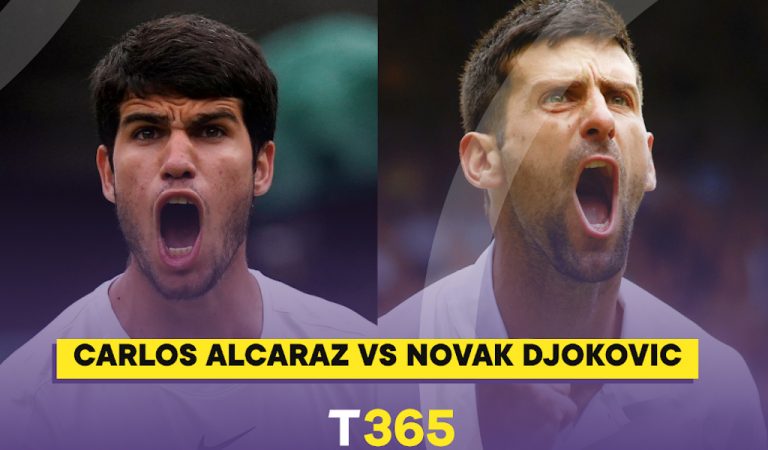Statistics confirm Carlos Alcaraz is several steps ahead of Novak Djokovic
At the age of 20, the Spanish superstar has emerged as the first player who looks ready to end the dominance of the ‘Big Three’ of Roger Federer, Rafael Nadal and Djokovic at the top of the men’s game.
Alcaraz won his first Grand Slam title when he was just 19 and as he defeated Casper Ruud 6-4 2-6 7-6 (1) 6-4 in last year’s US Open final and that ensured he became the youngest man ever to make it to number one.
He was more than a year younger than Lleyton Hewitt was when he topped the standings in 2001 and set the previous record.
Alcaraz then went on to beat Djokovic in last month’s Wimbledon final, becoming the youngest winner of the title at the All England Club since Boris Becker in 1985.
A glance at Djokovic’s record at the same age confirms he had yet to win a Grand Slam title and he did not make it to world No 1 until he was 24, after he beat Nadal in the 2011 Wimbledon final to take his first tile at that event.
Djokovic also took longer to start collecting ATP Masters 1000 titles consistently, with his first coming when he won the Miami Masters title in 2007 at the age of 19.
He was the youngest player to win the title in Miami, but it did not start a run of victories in the game’s biggest tournaments, but that record was taken by Alcaraz when he won in Miami for the first time since 2022.
Alcaraz has already won four ATP Masters 1000 titles in Indian Well, Miami and twice in Madrid, with his four titles at his current age highlighting his rapid rise to the top.
His second win in Madrid in May saw Alcaraz join Nadal as the only consecutive Madrid champions in tournament history and is the youngest player to successfully defend an ATP Masters 1000 title since Nadal at Monte-Carlo and Rome in 2005-06.
Of course, Djokovic’s challenges in his formative days on the tour were complicated by the quality of his opponents, as he was regularly facing Federer in his prime and a young and hungry Nadal.
It took time for Djokovic to get the better of those battles, with his second Grand Slam title coming in 2011 at the Australian Open, when he was 23.
The Serbian’s win in that Grand Slam final against Andy Murray in Melbourne fired the starting gun on one of the greatest years in tennis history, as Djokovic won three Grand Slam titles and a remarkable five ATP Masters 1000 events in an all-conquering year.
Djokovic’s consistency in the last decade has cemented his legacy as the greatest player of all-time, with his record-breaking 23 Grand Slam titles backed up by his 38 ATP Masters 1000 wins, which puts him two ahead of second placed Nadal in the all-time list.
Alcaraz has a long way to go before he gets anywhere near Djokovic’s iconic career statistics, but he has started his title-winning at a faster pace than his great rival.
Djokovic has managed to continue remarkable levels of consistency beyond his 36th birthday and if Alcaraz could follow that lead, he might have a chance to join the ‘Big Three’ in the race to claim the most titles in tennis.
Yet that dream is more than 15 years away, with injuries, dips in form and new stars certain to block Alcaraz’s path as he presses to join the list of the game’s all-time greats.














Post Comment